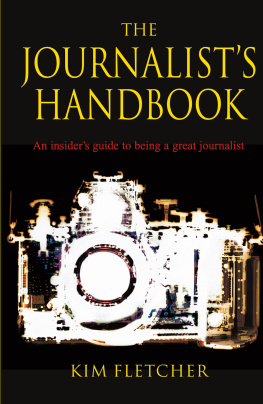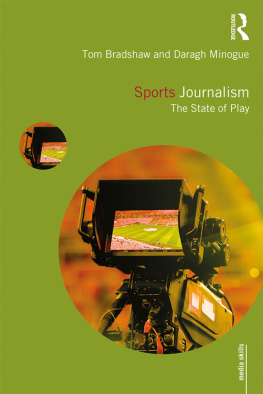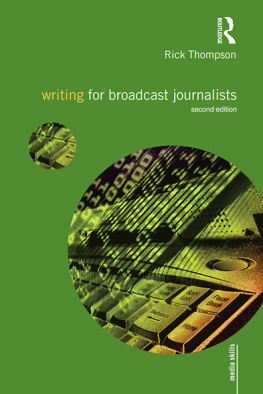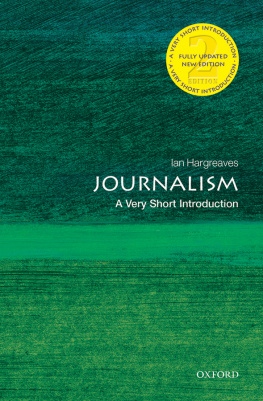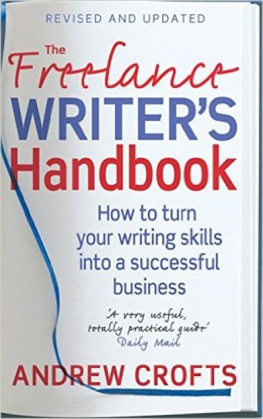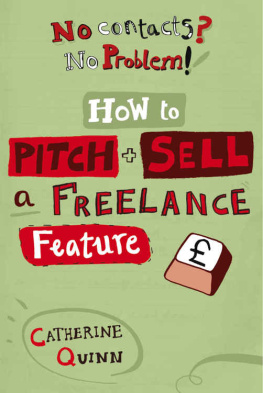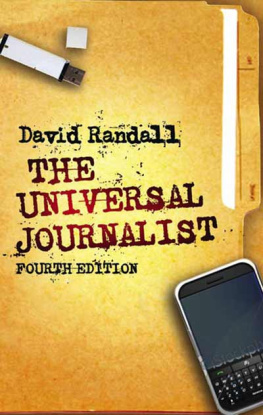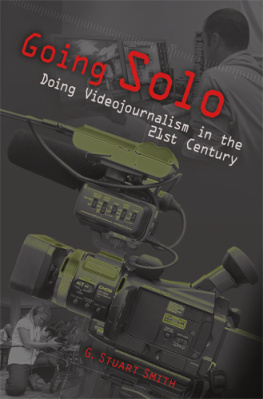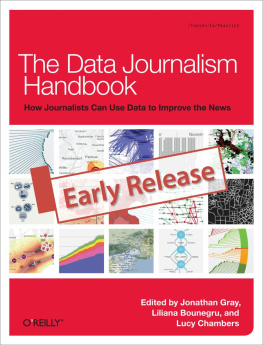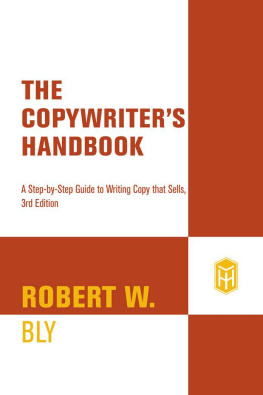THE
JOURNALISTS
HANDBOOK
An insiders guide to being a great journalist
KIM FLETCHER
MACMILLAN
Contents
Acknowledgements
This book would never have got off the ground without the enthusiasm of Morven Knowles at Macmillan, and Alex Stitt, who runs the Enterprises Department at the Daily Telegraph. Journalists are always flattered to be asked to write something, so when they suggested I expand on the media column that appeared each week in the paper, I agreed immediately.
When Morven Knowles gave in to the excitement of newspapers and came down to Canary Wharf to become publisher of Telegraph Books, Georgina Morley and Natasha Martin inherited me at Macmillan. They took me out for a big lunch, where they explained that journalists were the bane of publishers lives, being lazy, arrogant and incapable of writing to a deadline.
Not me, I said, and vowed to prove them wrong. Despite Natasha Martins generous encouragement, inspired editing and clever use of the guilt trap, I am not sure that I did so.
Pav Akhtar, a graduate of the Daily Telegraph training course, worked most efficiently on creating the contacts pages of this book and charmed editors and writers into passing on their career tips. I thank him and them.
My thanks are due too to my agent, Maggie Pearlstine, whos been waiting four years for a novel but thought this book might jump-start some writing. I fear she thought wrong.
And, of course, I thank all the journalists I have ever met, the good ones, the bad ones, the friendly ones, the ones youd hide behind a bar stool to avoid. One of them from the first category is my wife Sarah Sands, who shames me with her work rate, enthrals me with her prose and runs a 24-hour media tutorial service.
Finally, this book began before the war in Iraq, when journalists were routinely abused for reporting the private lives of politicians, recording the sexual activities of Premier League footballers and spying on celebrity drug-takers. In the war and in the peace that followed it journalists risked injury, kidnap and death. Some risked and lost. They showed what a proper trade journalism is, for which we might all thank them.
PART 1
THE INDUSTRY
So you want to be a journalist?
There are jobs that are guaranteed to make you admired: no one ever says that being a doctor is a waste of talent. There are jobs that are lucrative: who has ever met an investment banker with no money? There are jobs that are treated with respect: think of teaching.
And then theres journalism.
The Chambers Dictionary dignifies journalism with the label profession, as in the profession of collecting, writing, editing, publishing, etc. news reports and other articles for newspapers, journals, television, radio and related media...
But well-educated members of the professional classes shudder at the idea that their ranks include journalists. People give their lives to journalism, some have given their lives for it. But it is a trade, a business, a job.
It is as well to get this right from the start. The Oxford graduate with a double first in Greats who writes leaders for The Times and the reporter who left school at sixteen and who now goes under cover to report on massage parlours for the News of the World are in the same business. Indeed, they work for the same man Rupert Murdoch. From the newspaper plant that brings you The Times also comes the Sun. You dont have to admire or excuse all that is done in the name of journalism, but if you are serious about getting involved in it, you cant get away with pretending you are part of a different, more worthy business.
It may be this roughness at the edges, the fact that it is not quite proper, that gives journalism such appeal. It exudes a faint scent of risk, of mischief, of we may as well say it now grubbiness. If you are looking for the kind of job that makes you welcome wherever you go, youd better stop now. But you cant help feeling that journalists have a lot more fun than trainee solicitors.
Even the National Council for the Training of Journalists, the body that supervises training and decides whether you are competent to call yourself a senior reporter, acknowledges the appeal: Newspaper journalism is often seen as glamorous and exciting. But, before you get carried away with the romance of it all, the Council offers a little warning: As with any occupation, success comes only after much hard work and routine activity.
For many of us, it is the glamour rather than the hard work that formed our earliest impressions. They were encouraged by the film industry. In the early years of Hollywood, producers turned to journalists for scripts and to newspapers for subjects. So it is no surprise that films have helped recruit successive generations of journalists. I know people who work in newspapers today who cite Orson Welless Citizen Kane as a major influence on their choice of career, even though they were born twenty years after it was first screened in 1941. Then theres Billy Wilders 1951 film Ace in the Hole, starring Kirk Douglas as a cynical reporter who tries to manipulate an accident to the advantage of his story. And, famously, The Front Page, written for the stage in 1928 by Ben Hecht and Charles MacArthur, who drew on their experiences as reporters in Chicago. It was a big hit on Broadway, became a best-selling book and spawned four Hollywood film adaptations.
In the words of Robert Schmuhl, professor of American studies at the University of Notre Dame, the playwrights created enduring stereotypes of journalism: Different times and vastly different technologies notwithstanding, the drive of news competition, the excitement of a big story, and the sense of purposeful fun still animate how journalists think, talk, and act. Yes indeed, to the point that, if The Front Page leaves you cold, you may be making a mistake in looking for a career in journalism.
The technology is changing but the basics stay the same. Here is a job where someone is paying you to see things you would pay to see, to go to places where you couldnt otherwise go; to stand say on the fringes of a riot, to watch troops go in, to hear the Prime Minister at the despatch box, to see the fastest runner in the world; to absorb these things, to reproduce and describe them; to race for the phone, the laptop, the satellite link.
The television presenter and sports writer Michael Parkinson started his journalistic career in Barnsley, his home town, and has described how heavily he was influenced by the newspapermen he watched in the black and white Hollywood films of the 1950s. I worked in Barnsley twenty years later for the evening title the Star and was pleased to find that this romanticism was still going strong. It was now 1980, but the latest trainee on the Chronicle had bought himself a trench coat and a trilby and, having just reached eighteen, had taken to leaning on the bar of the pub rather than hiding at the back. Whenever he opened his wallet to pay for a round of drinks, hed make sure that the barmaid noticed the press card in it. This, he felt though we never saw the notion proved would establish him as a tough-talking, wisecracking ladies man in the great tradition of film noir.
And just as the influence of recycled films might have started to wane, along came an event that defined the power of the press. For the age group looking now towards retirement men and women in their fifties the big spur was Watergate, the finest hour of American journalism, when the painstaking work of two reporters on the Washington Post led ultimately to the impeachment and resignation of President Richard Nixon in 1974. The film that followed two years later, All the Presidents Men
Next page
